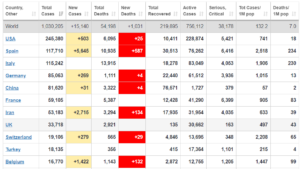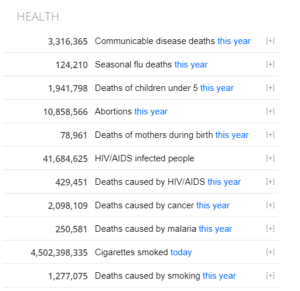Invasion of Europe news…..
Everyday I check to see if the dire warnings the UN and its ideological partners have come to pass that a catastrophe is in the making in crowded refugee camps in Greece.
Not “carnage” yet, but the first cases of Coronavirus have appeared.
Of course those who have been encouraging the migration to Europe now say that something must be done. But what, really, there is no magic bullet for the refugees or for any of us.
From NPR:
Greece Records First Coronavirus Cases Among Refugees, Imposes Quarantine On Camp
Since the outbreak of the coronavirus pandemic, medical personnel, human rights groups and others have warned of catastrophe if COVID-19 spreads to the roughly 60,000 refugees living in often-squalid camps in Greece.
Now the virus has arrived. This week, at least 20 refugees living in the Ritsona camp, near Athens, have tested positive for COVID-19. The camp is now on lockdown for the next two weeks.
In 2016 protesting refugees said they didn’t need food they just wanted to be allowed to migrate into Europe.
“No one can go in or out” except for essential personnel like healthcare workers, Migration Minister Notis Mitarakis told Greece’s SKAI radio on Thursday.
Authorities were first alerted earlier this week, when a 19-year-old resident of the camp tested positive for COVID-19 after giving birth at an Athens hospital.
Healthcare workers immediately began testing more than 60 Ritsona camp residents who had come into contact with the woman. The 20 who tested positive for COVID-19 currently do not have symptoms, Greece’s migration ministry says.
Testing of the 2,700 refugees living in Ritsona will continue during the 14-day quarantine. [Check it out! They will all be tested.—ed]
[….]
Mitarakis, the Greek migration minister, told members of the European Parliament’s home affairs committee that there is no room on the Greek mainland for the refugees.
“We will strongly welcome any offers of relocation from member states that have capacity,” he told the lawmakers Thursday, “because we cannot resolve this crisis instantly and alone.”
The European Union is deeply divided on the issue of refugee relocation. On Wednesday, the European Court of Justice said three anti-migrant EU countries — Hungary, Slovakia and the Czech Republic — broke EU law by refusing to accept refugees under a EU-mandated relocation program.
By the way, if you are interested in the COVID-19 numbers from Europe and from the rest of the world, check out Worldometer. It is very interesting.
This is a screenshot of the top infected countries today, April 3, 2020:

For a little perspective….
If you heard Rush Limbaugh talking about these numbers this week, here it is at Worldometer at this moment in time!









 “Our primary focus is to keep our plants running so that we can feed America,” Tyson’s president, Dean Banks, said on CNN. “We’re running the plants as hard as we can.”
“Our primary focus is to keep our plants running so that we can feed America,” Tyson’s president, Dean Banks, said on CNN. “We’re running the plants as hard as we can.”